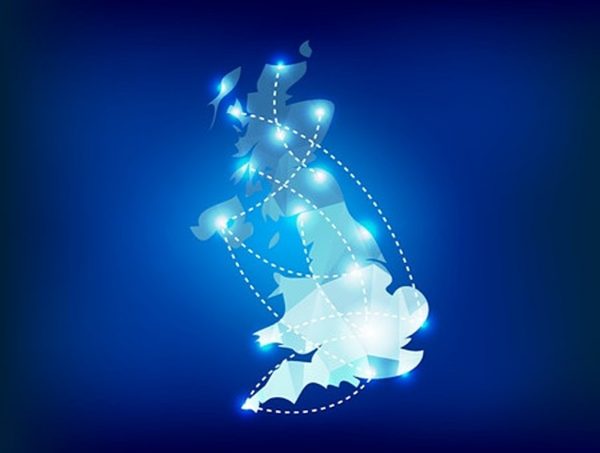COVID-19 – A Look at Monday’s UK Internet Traffic and ISP Speeds

Yesterday was an important day for broadband ISPs in the United Kingdom because it was the first working Monday after the mass closure of schools, which has concentrated the demands of both home (remote) working and family internet traffic on to residential connectivity. But as expected the day was busy, albeit uneventful.
Over the past few weeks we’ve all heard the often scaremongering TV and newspaper reports, which have claimed that broadband in the UK would be “unable to cope” with the change in internet traffic as more people suddenly find themselves stuck at home. We’ve already explained – repeatedly – why such an interpretation, which fails to understand both the nature of the traffic change itself and how ISPs actually manage it, is so misleading (here).
Since then a number of major video streaming providers (e.g. Netflix, YouTube, Apple TV, Amazon and Disney+) have implemented measures to reduce the video quality of their streams. But in reality the impact on data traffic from this adjustment is likely to be limited because most ISPs already cache popular video content closer to their end-users (CDN – Content Delivery Network), which saves their external links from being put under real strain.
Advertisement
Nevertheless we decided to keep a close eye on traffic passing over the London Internet Exchange (LINX) yesterday. We were expecting the combined impact of home working and school closures to push the level of daytime internet traffic a bit above last Monday, albeit not excessively so since the weather was fairly stable (i.e. children could enjoy the garden a bit more, where available).
As expected the 23rd March saw a modest increase in usage over Monday last week. For example, LINX’s primary LON1 switches recorded a peak of 3.86Tbps (Terabits per second) at 6pm on 16th March, which compares with 4.17Tbps at 5pm on 23rd March. Noticeable but we have seen a similar peak last Tuesday.

We also asked a few of our readers to conduct some broadband speedtests during the day across the four largest ISPs (BT, TalkTalk, Sky Broadband and Virgin Media) but noticed no real deviation from their normal line performance, although this was far too anecdotal to draw any solid conclusions.
Advertisement
Thankfully it looks like Andrew at Thinkbroadband read my mind and conducted a much wider analysis to look at average broadband ISP speeds (all packages and connection types) – those conducted via TBB’s speed tester – over the past few months. The result helps to reinforce what we’ve been saying for awhile now, which is that fixed broadband ISPs in the UK are perfectly able to adapt.

The next event to watch will be today’s Disney+ launch, although we suspect that the major ISPs will have already worked with them to optimist their CDNs and so, once again, the impact shouldn’t be too big. Likewise we often see that the use of one video streaming service tends to replace, at least in part, the use of another (i.e. people choosing to watch Disney+ when they might normally binge YouTube or Netflix etc.).
At this point it’s worth reminding readers that consumer consumption of data is constantly rising and providers are always upgrading their networks to keep pace, often while planning several years in advance for future demand. For example, the average monthly data volumes per household on fixed broadband connections jumped from 240GB (GigaBytes) in 2018 to 315GB in 2019.
Advertisement
Most networks are built to cope with significant peaks (surges) in usage that can go many times above their normal levels and thus people really need not worrying about broadband ISPs running into too much difficulty. Admittedly some ISPs might have been more lax with their upgrades and localised congestion issues can still occur (usually experience as mildly slower speeds), but that’s true even in normal times.
Broadly speaking what we’re seeing falls into the ‘busy.. but still business as usual’ category. A far bigger threat to ISPs is the impact of COVID-19 on staffing, which has already hit the ability of some providers to handle new sales, provide effective customer support and send out engineers. Delays should be expected and please only contact your provider if it’s truly urgent.
Now it looks like some of the mass media have switched their attention to mobile networks. The FT (paywall) reported yesterday that “a surge of up to 50% in the number of phone calls being made over mobile and landline networks has put Britain’s telephone system under significant strain,” which they said has resulted in issues of call quality, dropped calls and a major outage last week (we think they meant this, which was not attributed by the operators to the impact of the Coronavirus).
Quite why the FT also singled out “landline networks” above we do not know as the way they’re setup should not really cause the same sort of problems as mobile networks may experience. Indeed we’ve yet to see any evidence or mass complaints about such things (i.e. nothing above the normal level of gripes, usually focused on copper line quality etc.).
However, mobile network infrastructure is fundamentally different from fixed lines and we have, in the recent past, seen examples where major unexpected events (e.g. terrorist attacks in a busy city centre) have temporarily overwhelmed localised cells with a massive surge in new requests (calls, data connections, texts etc.).
Realistically it can be difficult to prepare mobile infrastructure for such things at every single location but they do improve with each new generation of technology. On the bright side as more people work from home then the mobile burden should ease as some traffic will switch to WiFi etc.
Mark is a professional technology writer, IT consultant and computer engineer from Dorset (England), he also founded ISPreview in 1999 and enjoys analysing the latest telecoms and broadband developments. Find me on X (Twitter), Mastodon, Facebook, BlueSky, Threads.net and Linkedin.
« COVID-19 – Facebook and Instagram Reduce Video Quality
COVID-19 – KCOM Won’t Disconnect Users for Non Payment »






















































optimist/optimise
I just want all this to end now with this covid 19 it’s making everyone turn in to mad hatters. This Boris Johnson is doing it all wrong all he had to do was lock it down but no people are still going out and infecting people.
Is it me or are the press trying to make out there is a problem with performance for ISP’s?
Just trying to find more things to scare the public about.
The NHS needs protecting yes but the Internet doesn’t.
Its not just broadband they are banging on about. They started the panic buying rubbish and are now peddling the “its not fair on the key workers” headlines.
It’s all about traffic for them, they don’t give a monkeys. Zero repercussions.
I’m beginning to understand why many countries don’t have a ‘free’ press.
I spoke at some length to Liam Kelly of the Sunday Times on Friday morning to explain why UK ISPs should not have a problem with bandwidth and shared the helpful blog post from Howard Watson of BT which had been published that morning. We talked about the difference between the daytime and evening peaks and the likelihood of at least some home working activity simply displacing traffic from offices. We also touched on things that do push up traffic levels, primarily uncoordinated game updates etc.
Unfortunately the article that he wrote veered towards a more negative angle, starting with the headline “unreliable broadband hinders work from home”, which is simply untrue for the vast majority of us. I think some of the point in the article conflated capacity of the broadband network as a whole (ie the trunk network) with the limitations of connections to some premises, and also confused some services being slow due to server limitations with there being constraints imposed by networks.
Those of us that are more technically aware need to continue to try to educate journalists to help improve the accuracy of these stories and to highlight errors where they do arise. As Mark covers in the article, most networks are built to cope with significant peaks and there is no evidence at the moment of any problems. Not an exciting headline but the facts are what matter here rather than clicks or newspaper sales.
Alas there’s another story here that, once again, ignores what both ISPs and the evidence is showing. Sigh:
https://www.thesun.co.uk/tech/11232963/uk-internet-rationed-prioritise-apps-websites-traffic-speeds/
mark i’ll be cynical and suggest panic buying has run out of steam so they are looking for a new crisis story
Well done Andrew for trying but “ISPs have another normal day” is not a good headline.
Something else to watch out for – in certain news articles there are quotes from network operators stating “traffic is up by 50%” or similar and this is being used to scaremonger. My understanding is these numbers are an increase in volume (eg GB/day), not peak Gbps, so only relevant for the mobile operator billing teams and completely irrelevant for capacity purposes.
And yet for all this that was predictable the media co’s are still reducing their data streams…
Because of political pressure, not technical issues.
That, or they don’t want to pay the extra for unplanned transit.
We are seeing an increase in day time traffic as expected, but this is far below peak evening usage. So far our network has coped fine with increases in calls and usage with no issues.
We are all fully aware of how vital our infrastructure is to the safety and well being of our customers and the country, yet for some reason the media and politicians are making it out like we’re running ancient creaking networks barely fit for purpose.
Oddly enough the media are not going around telling the NHS, electricity workers, etc. how bad they are at their jobs. Not sure why we seem to be fair game for an issue that doesn’t exist. Probably because “media slanders hard working NHS heroes and power workers keeping lights on” would give a lot of bad attention.
Anecdotal it may be but my BT Unlimited Broadband connection which normally averages at 15MHz download and 0.74MHz upload has increased to 17MHz down and 1Mhz up. Not much change but a good sign.A bigger threat to the internet is hardware failures. Plant seems to be holding up really well so far, but with maintenance company reductions and hotels closed support is going to be limited. Perhaps they are working so well because nobody is touching them.